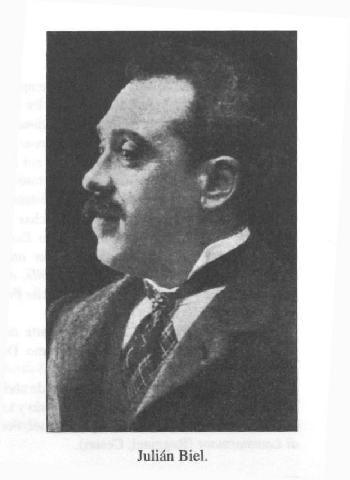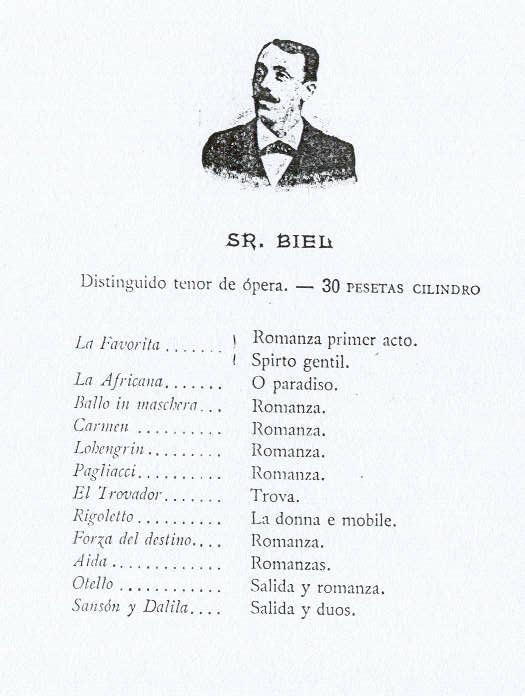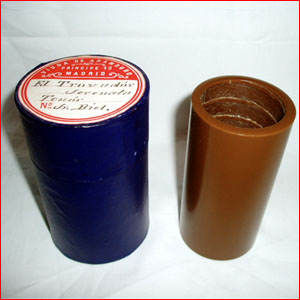Julián Biel
7 January 1869 Zaragoza – 5 August 1948 Barcelona
In RA format
In RA format
On Biel's life and career, a lot of research is missing; so far, there is an unusual lot of question marks. Not even his
dates of birth and death are undisputed; for his birth, also 1870 can be found, and for his death, 1945 and 1917 (but the
1948 date given above is definite). He was from poor conditions and worked as a confectioner and a wallpaperer before
becoming a singer, his voice was discovered when he sang at work, and at some point, he moved from Zaragoza to Madrid. As
for the details, it's all question marks: it may be that his boss at the pastry shop in Zaragoza was the first one who told
him to make use of his beautiful voice, that he entered a choir first and then went to Madrid to take voice lessons, while
working as a wallpaperer to earn a living – but that's not proven and tested.
The next confirmed steps are his career start as a chorister at the Teatro Real in 1898, his promotion to soloist in 1899,
and his departure for Italy in 1900; and also that the Marquise of Villamejor sent him to Rome for vocal studies with
Antonio Cotogni. But: question marks as far as the sequence of
events! One account has him make his chorister and soloist debuts in 1898 and 1899, respectively, has the Marquise hear him
on stage and send him to Cotogni in 1900. The other account (which makes for the better story, but isn't necessarily more
accurate just for that reason) tells how he wallpapered some rooms at the residence of the Marquise, and how his singing
during his work attracted her attention; then she would have dispatched him to Rome well before 1898, he would have returned
after his studies with Cotogni, sung in Madrid first as a chorister and then as a soloist, and returned to Italy in
1900 to sing and not to study there. (If the attribution of the anonymous AICC cylinder – see discography below
– to Biel is correct, and if it has indeed been recorded in Milano in 1898, that would prove the
wallpapering-at-the-Marquesa's version, but having heard that cylinder, I'm not convinced that it's really Biel.)
In any case, a brilliant and short career ensued. In 1901, he sang in his native Zaragoza for the first time, in 1902 in
Buenos Aires (in Aida) and Montevideo, in 1903 at the Liceu in Barcelona (Africaine), and from 1903 to 1907, he was a regular at the Teatro
Real, while making very successful guest appearances: at the Liceu, (1906/07), in Bologna, at La Scala (where Toscanini
thought him to be the best Manrico of his time), at Covent Garden in 1905/06 (where he was considered Caruso's equal), in
France, Belgium, Germany, Russia and Lisbon (Africaine, 1901 and 1910). From 1907, he sang a lot in South America: Santiago
de Chile, Valparaíso, and again in Buenos Aires and Montevideo.
He retired early after developing a stage fright so severe that it was considered neurasthenia (or total nervous exhaustion).
Question marks, once again, as to any details: his retirement took place in 1910 as per Kutsch & Riemens, or in 1917 as per
Spanish sources. Well, 1910 cannot be true since he sang his first Otello in Buenos Aires in 1911; but as no further Biel
performances after that 1911 Otello have been listed by anybody, 1917 doesn't seem probable, either.
He was a voice teacher in Barcelona for the rest of his life.
Reference 1, reference 2, reference 3, reference 4: Kutsch & Riemens
Repertory
Il trovatore – Madrid, Buen Retíro, 1899
L'Africaine – Madrid, Moderno, 1899
Ernani – Roma, Quirino, 1900
Aida – Madrid, Real, 1901
Carmen – Lisboa, São Carlos, 1901
Lohengrin – Barcelona, Liceu, 1901
I lombardi alla prima crociata – Lisboa, São Carlos, 1903
Samson et Dalila – Barcelona, Liceu, 1906
Cavalleria rusticana – Barcelona, Liceu, 1907
Norma – Santiago de Chile, Municipal, 1907
Horrida Nox (composer: Berutti) – Buenos Aires, Politeama, 1908 (world premiere)
Pagliacci – Milano, Dal Verme, 1909
Die Walküre – Barcelona, Arenas, 1909
El dúo de La africana (composer: Caballero) – Barcelona, Arenas, 1909
Otello – Buenos Aires, Marconi, 1911
Discography
AICC, Milano, 1898 (anonymous cylinder, no definitive proof that it's Biel)
36 La favorite (Donizetti): Spirto gentil 36
Viuda de Aramburo cylinders
I wish to thank Carlos Martin for the information.
Gramophone, Milano, February 1903
3062R Il trovatore (Verdi): Deserto sulla terra 52689, X-92109
3064R Pagliacci (Leoncavallo): Vesti la giubba 52690, X-92097
3065R L'Africaine (Meyerbeer): O paradiso 52691, X-92074
3066R Il trovatore (Verdi): Ah sì, ben mio 52692, X-92135
3068R Le prophète (Meyerbeer): Sopra Berta 52693
3077R Andrea Chénier (Giordano): Un dì all'azzurro spazio 52694
3078R Il trovatore (Verdi): Di quella pira 52695, X-92143
3079R Aida (Verdi): Celeste Aida 52696, X-92119
3100R La forza del destino (Verdi): O tu che in seno 52714
3101R La Juive (Halévy): Rachele, allor che Iddio 52697, X-92122
3102R Samson et Dalila (Saint-Saëns): Figli miei, v'arrestate unpublished
Partial reference: Gesellschaft für historische Tonträger, Wien
I would like to thank Richard J Venezia for the recordings (Juive, Africaine).
I wish to thank Roberto Marcocci for the photograph.
I wish to thank Antonio Massísimo for the repertory list.
|


